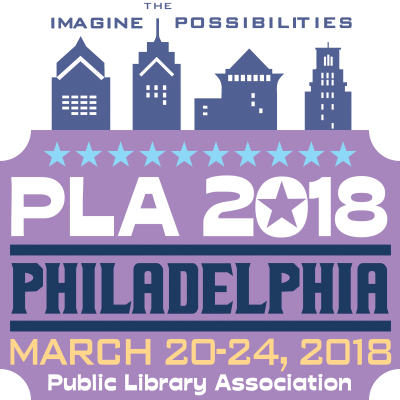A lot of the 2018 PLA Conference for me was sharpening the tools I have in my toolbox to ensure I am standing on a firm foundation when designing and implementing programming. Can I speak to how the programs I am doing align with the mission of my library? How do I know that I am actually doing what my community wants? There is a lot of information I am still digesting and sorting through, but below are the top three lessons that I am working on putting into practice.

1. Define your priorities and then establish boundaries.
In the first Big Ideas session, Elizabeth Gilbert asked where the spotlight of our attention is going and if that aligns with our priorities. She urged us to protect that space so we can actually accomplish what we are intent on accomplishing. You are only one energy stream and cannot do it all. Gilbert advised that you are going to have to say no to things you want to do — not just the things you don’t want to do.
A way to practically do this in your job was shared in the Agile Goes to the Library session, where Elizabeth Tracy and Chelsea Jordan-Makely went in-depth on their project management and planning processes tools. My take-aways: Work with your supervisor to define the priorities of your job position. What are the projects that you need to do? Turn this into a visual list. When you want to take on (or are asked to take on) a new project, figure out where in the list of priorities that new project will fit. This can help determine if you and the project have the support it needs.
2. When it comes to complaints or issues in the library, keep digging until you get to the root of the problem rather than stopping at the symptom.
Susan Brown and Meeghan Rosen from Chapel Hill Public Library spoke on how they follow the "5 Whys" in order to understand the real source of the issue in Assessing and Aligning Service Philosophy, Service Delivery, and Service Points. This mindset involves continually asking why until you get to the root. An example how this can be related to programming:
- The problem: We have a lot of no-show registrants at our programs.
- Why are they not showing up? They don’t remember the program is happening.
- Why do they forget? Life is busy and they forget about it last minute.
- Possible real issue: Reminder calls are either not given or are scheduled to far away from the program.
The result of asking threads of “whys” will not only lead you a position of possible solutions, but it will also help put you into a place of thinking openly and curiously about your community.
This pairs really well with what Brooklyn public librarian Brynna Tucker shared in Think Outside the Books: Building Innovative Programs and Services Through Staff Empowerment. One of her points was that a way to get to action and problem solving in your library is by taking complaints and reframing them into growth mindsets, where new ideas are fostered and things can be improved. If the complaint is “there are a lot of teens in the library and they are noisy,” this can be changed to “it is great that teens are using their library, and we should look into how we can channel their energy.” The next step would be to look into programming possibilities for the teens or adjusting the spaces provided for the teens.
3. Add evaluation checks into your program design.
When developing longer-term programs such as book discussions or movie nights, include a cancellation clause in your program planning. This advice came from Katy Hite and Alexandra Skinner’s session, It’s So Hard To Say Goodbye: Strategies and Best Practices for Sunsetting Legacy Programs. What are the outcomes you’re desiring out of this program? What will it look like when they’re met? What if they’re not being met? At what point do you throw in the towel or start exploring other options? As Elizabeth Gilbert said, “you are only one energy stream.” Your library resources are finite, and by thinking about the end at the beginning it will help you be intentional about the longevity of your program and the impact it’s making while it’s running.
You can also check in with your program to ensure that your goals match up with the community's goals. Julianne Rist from Jefferson County Public Library shared in the Project Outcome pre-conference that they added a question asking, "why did you sign up for this class?" to their evaluations. The question shines a light on what their community wants and helps to point out if there are any gaps in their programming. If you have a registrant in your book discussion say that they joined your book discussion to engage in conversations about mysteries but your library only has a nonfiction book club, that would give you information on one of your patron’s needs and where there is potential to grow.
Where do we go from here?
It was a week of jamming information into your brain through sessions, following #PLA2018 online to increase the scope of your learning, and/or grilling your colleagues on what they learned. How do you mobilize the information you took in?
Not everything can, or should, be acted upon right away. A lot of the information needs time to percolate or exists as affirmation of what you and your library are already doing. However, if there are strategies or advice you want to implement, one way you can go forward is to start small:
- Talk about it to anyone that will listen, preferably people that are interested in listening. Going over some of the ideas you ingested will help crystallize what you learned and bring it into the context of your community. This can be as informal as a lunchroom conversation or as formal as a staff program centered around conference attendees sharing on some of the sessions they attend.
- Begin with yourself. What is something small you can act on that mostly impacts only you? One of my first steps of action will be prioritizing my projects. This initial tiny step propels me into a direction that I would be interested in seeing my department adopt, yet is manageable with very low stakes and will give me local data to share with my department head.
- Add to a project you're already working on with a buddy. Is there a collaboration in progress where you can incorporate what you learned that would be beneficial to the project? If so, great! Who knows what the ripple effects will be. If not, don't force it. I have been talking about program evaluations with a colleague and now have additional tools I can bring to the table with several direct contacts we could go futher in-depth with.
Inspired and armed with new ideas and affirmations, in the words of poet John Milton, "Let us go forth and resolutely dare with sweat of brow to toil our little day."



